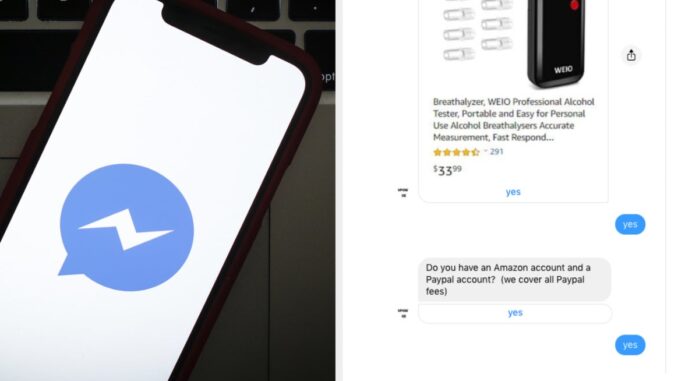
A few hours later, the page, Anleolife, asked Smith if he would write a review with photos or video in exchange for the free item. But first, the seller needed a screenshot of his Amazon profile, to verify that he was, indeed, a customer who has written reviews before.
The page assured Smith that the refund would come after the review was published, but taxes and PayPal fees wouldn’t be covered. Smith accepted the offer and said the bags were what he expected. But, he warned, “I generally take all reviews with a grain of salt if they are overly enthusiastic over something simple like a memory card, or a canvas bag.”
Some Amazon sellers use a chatbot to automate the entire interaction. “Hello! Thanks for your interest!” responds one Facebook page, named VPOW GE. “Do you wanna test our FREE portable breathalyzer? It’s [sic] real cost is USD33.99, but now it is free for testing in limited time! (If yes, simply click the “yes” button under the picture to proceed.)”
Each of the page’s questions were followed by clickable “yes” and “no” buttons. Do you have Amazon and PayPal accounts? Yes. Can you leave a review one week after receiving the package? Yes. Confirm that your first review was published before June 1, 2019. Yes, confirmed.
On Facebook, sellers can evade Amazon’s detection. Paying or offering a free product to customers to leave reviews violates the company’s policies. But because real Amazon customers are instructed to purchase the products and wait for a period of time before rating the item, the review appears genuine.
After BuzzFeed News reported the breathalyzer ad to Facebook, the company removed it, but didn’t elaborate on what policy the ad violated. “We would always need to review any particular ad against our policies,” a company spokesperson said.
While the ad is no longer live, the WEIO breathalyzer is still being sold on Amazon, and, as of publication time, is recommended as “Amazon’s Choice.”
Another Amazon customer, Peter, which is not his real name, has ordered a handful of items through Facebook ads, mostly USB cables and chargers. Most recently, he signed up for a free solar charger, in exchange for his positive review. The Facebook ad campaign for the product has been running since Sept. 30.
The Amazon seller, who runs the Facebook page Fun Corner, urged Peter to trust that the PayPal refund would eventually come. “There is no reason and no good for us to deceive our testers, because our products are all fulfilled by Amazon,” the seller wrote in Messenger.
The product is listed on Amazon under the brand “Panergy” and sold by a seller named “Tenderwave.” The disparate names — for the ad, the brand, the seller — make it difficult to determine who is selling the ad and the product.
As of the time of publication of this story, the charger had seven 5-star ratings, all written within the last two weeks, when the Facebook ad went live.
An Amazon spokesperson told BuzzFeed News that, last month, 99% of the reviews read by customers were authentic, and that the company employs machine learning software to analyze reviews and remove what it detects as inauthentic reviews. “Last year, we prevented more than 13 million attempts to leave an inauthentic review and we took action against more than 5 million bad actor accounts attempting to manipulate reviews,” she added.
While Amazon may be becoming more adept at catching inauthentic reviews on its own platform, it is unequipped to catch scammers outside of it. In response to last week’s story, readers submitted six different Facebook ads to BuzzFeed News that, they say, are published by Amazon sellers looking to give away freebies for 5-star reviews. Facebook and Amazon didn’t immediately provide comment on the specific cases.
This content was originally published here.

Leave a Reply